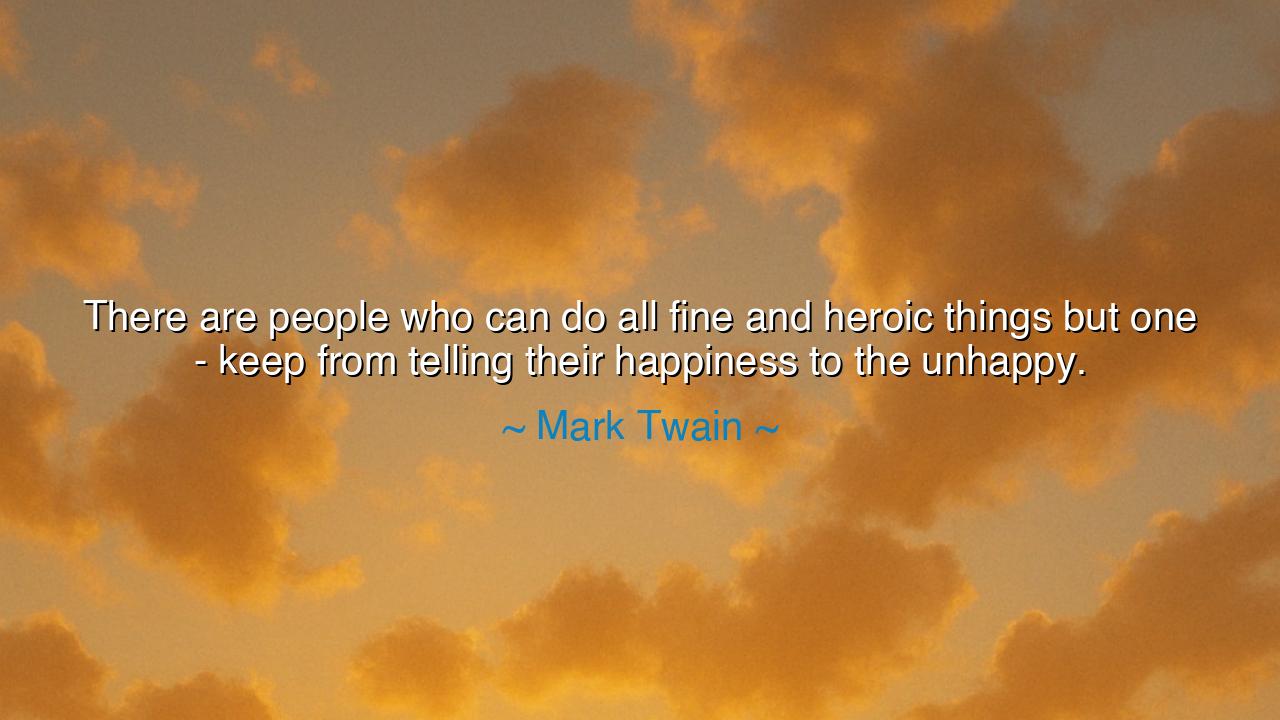
There are people who can do all fine and heroic things but one -
There are people who can do all fine and heroic things but one - keep from telling their happiness to the unhappy.






Hear now the voice of Mark Twain, the great observer of human nature, the humorist whose laughter was sharp as truth and kind as mercy. He once said: “There are people who can do all fine and heroic things but one — keep from telling their happiness to the unhappy.” In this simple yet piercing sentence, he reveals a deep paradox of the human heart — that even the virtuous, even the noble, often fail at the most delicate act of compassion: silence. To act bravely, to speak boldly, to labor for others — these are visible and admirable deeds. But to restrain one’s joy in the presence of another’s sorrow — that is a quiet heroism that few ever master.
Twain, who spent his life among the joys and sorrows of mankind, understood the strange vanity hidden in our goodness. He had seen men perform grand acts of courage and women display endless kindness, yet falter when asked for the simplest empathy — the grace to withhold their own triumphs when standing beside the broken. For in every age, there are those who, though generous in action, lack the sensitivity of spirit that perceives another’s pain. They mean no harm, yet their unguarded words wound. Their joy, proclaimed without thought, becomes a burden to the grieving. Twain’s wisdom, spoken with gentle irony, reminds us that true compassion requires not only doing good, but understanding when not to speak at all.
This truth has echoed through the ages, for even the ancients knew the power of restraint. The philosopher Epictetus taught that the wise man does not boast of his fortune before those who have none. King Solomon, in his Proverbs, wrote, “He that blesses his friend with a loud voice, rising early in the morning, it shall be counted a curse to him.” Twain’s words carry that same eternal warning: that joy, when shared without discernment, may turn into sorrow for another. To parade one’s happiness before the suffering is to forget the sacred bond of empathy that binds all souls together.
Consider the story of Job, that man of ancient sorrow, whose friends came to comfort him after his ruin. Instead of sitting quietly in understanding, they offered long speeches filled with self-righteousness and certainty. They spoke of their own wisdom, their own good fortune, and their own sense of order. But Job’s heart was already shattered; their words only deepened his grief. What he needed was not their talk, but their presence. In this, Twain’s insight finds its echo: it is not enough to be moral or wise or heroic — one must also be kind enough to keep one’s happiness in check when another’s heart is in mourning.
The flaw Twain exposes is not malice but thoughtlessness — that subtle blindness born from comfort. When life smiles upon us, it is easy to forget how sharp joy’s brightness can be to eyes still accustomed to the dark. To tell one’s happiness to the unhappy is like singing loudly beside a sleepless friend. The song itself may be beautiful, but it comes at the wrong hour. And so, true wisdom lies not in silencing joy forever, but in knowing when to speak it softly, when to offer comfort instead of comparison, and when to let another’s sorrow take precedence over one’s own delight.
Yet Twain’s teaching is not meant to shame the joyful, but to deepen their understanding. He does not say we should hide our happiness, but that we should wield it wisely — as a light to warm, not to blind. Joy, when tempered with empathy, becomes grace. The happiest souls are not those who trumpet their blessings, but those who quietly share them — who use their abundance to uplift the weary, their laughter to lighten another’s burden. To keep one’s joy humble before the suffering is the highest act of tenderness, the final lesson of love.
So, my child, take this wisdom to heart: speak gently in the house of sorrow. When you are happy, be grateful — but be mindful. Let your joy walk softly, as one carrying a torch through the dark. Listen more than you speak; comfort more than you celebrate. Do not measure your goodness by your grand deeds alone, but by your ability to understand another’s silence. For the truest hero is not always the one who conquers, but the one who knows when to be still — when to guard his joy out of respect for another’s pain.
Thus spoke Mark Twain, the master of laughter who understood tears. His words remind us that the greatest virtue is not only to act bravely, but to feel deeply; not only to give generously, but to understand quietly. The soul that can rejoice without arrogance, and sympathize without judgment, walks the highest path of all. So let your happiness be humble, your compassion strong, and your words gentle — and in this, you will not only do heroic things, but become a comfort to the world.






AAdministratorAdministrator
Welcome, honored guests. Please leave a comment, we will respond soon